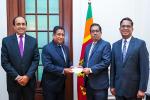As the Head of Mobile Experience at Samsung Sri Lanka, I consider it my duty to delve into the intricate ramifications of parallel imports and propose strategic measures imperative for fortifying our nation's economic resilience.
The implications of parallel imports extend beyond mere surface observations, compelling us to explore their deeper repercussions.
But first – what exactly is considered ‘Parallel Imports’?
Parallel imports, known as 'grey goods,' involve branded products entering markets without brand owners' authorization and these genuine items lack consent for specific market distribution.
Often sourced from countries with lower prices or different packaging, products are re-imported into other markets.
This arises due to price disparities, regional market variations, and import taxes.
Parallel imports offer reduced prices, attracting cost-conscious consumers.
The gravity of these parallel imports lies in their direct threat to Sri Lanka's economic stability.
These unauthorized imports divert substantial revenue away from legitimate channels and contribute to significant tax losses.
For instance, Samsung incurred around LKR 330 million losses from 2020 to 2023 due to such imports, in stark contrast to the legitimate tax contribution of LKR 3,802,408,685.
Authorized competitors contributed LKR 5,081,089,154 in taxes, highlighting the disparity between legitimate channels and parallel imports.
Notably, parallel imports also led to job losses—2500 direct and 500 indirect—which impacts families and the industry.
Moreover, while parallel imports might offer seemingly alluring products at lower prices, this apparent affordability conceals a more sinister cost.
The proliferation of these unauthorized products erodes consumer trust in authentic brands, discouraging investments in research and development.
As consumers are enticed by these seemingly budget-friendly alternatives, the potential implications for authorized businesses loom large.
Furthermore, the challenge of parallel imports is not limited to economics alone; it has the power to induce a shift in consumer behavior.
This shift can lead consumers away from legitimate distribution channels, inadvertently fostering a preference for cheaper alternatives.
Such behavioral shifts disrupt market equilibrium and pose significant challenges to established businesses.
These shifts have the potential to send ripples through the economy, leading to far-reaching consequences.
Addressing the multifaceted challenges posed by parallel imports requires a united effort spanning all sectors of our society.
Strategically navigating the challenge of parallel imports necessitates collaborative efforts from all corners.
To counteract the influence of parallel imports, we must establish and enforce robust Intellectual Property Rights (IPR) frameworks.
These frameworks should comprehensively protect brand owners and their trademarks.
This entails implementing stringent legal measures and penalties to deter involvement in parallel imports and trademark infringement.
Additionally, the power of knowledge is pivotal in combating parallel imports.
Public awareness campaigns can illuminate the importance of supporting authorized distribution channels while shedding light on the potential repercussions of purchasing unauthorized goods.
Furthermore, fostering productive dialogues with governmental bodies can amplify the understanding of the far-reaching consequences of parallel imports.
By articulating the negative impact on our economy and society, these conversations can pave the way for stringent regulations and robust enforcement mechanisms.
We strongly advise customers, not just Samsung’s but of all brands’, to exercise caution when dealing with unauthorized sellers offering below-standard warranties, such as 6 to 3 months or shop warranties.
Samsung Sri Lanka for example emphasizes authenticity and quality by exclusively partnering with authorized dealers.
This strategic collaboration ensures strict adherence to Samsung's rigorous standards, delivering peace of mind to our customers.
When you purchase from our authorized dealers, you enjoy the exclusive benefits of a one-year comprehensive warranty.
This warranty underscores our commitment to product excellence and serves as a testament to our confidence in the durability and performance of our devices.
Opting for Samsung's official channels guarantees that you receive the full benefits and protection that come with a genuine Samsung device.
Furthermore, at Samsung Sri Lanka, we exclusively offer TRCSL-approved products.
TRCSL (Telecommunications Regulatory Commission of Sri Lanka) certification signifies adherence to local regulations and standards, ensuring quality and compliance.
We encourage all our customers to verify the TRCSL certification status of their devices before making a purchase, which can be conveniently done by sending an SMS to 1909 with the message "IMEI (Space) IMEI Number."
On a broader level, these are some steps we take to ensure maximum safety and satisfaction for our customers.
Championing Sri Lanka's economic prosperity amidst the challenge of parallel imports is a shared responsibility.
The urgency of addressing this issue surpasses economic concerns; it embodies our commitment to innovation, consumer confidence, and sustainable growth.
As a leader in Samsung Sri Lanka, I am steadfast in guiding our nation towards an economy characterized by resilience and strength.
By harnessing strategic collaboration and unwavering determination, we can navigate the intricate landscape of parallel imports and forge an economic environment that enriches the lives of all Sri Lankans.
About the writer
The writer serves as the Head of Mobile Experience at Samsung Sri Lanka.
He began his journey with Samsung in 2011 as a Project Engineer at Samsung Research Institute, India.
Over the years, he held key roles, including Mobile Product Manager, with expertise in R&D, Product Management, Marketing, and Retail.
His academic qualifications include a BCS degree in IT and an MBA from Bedfordshire, with ongoing Ph.D. studies in Strategic Management.






















